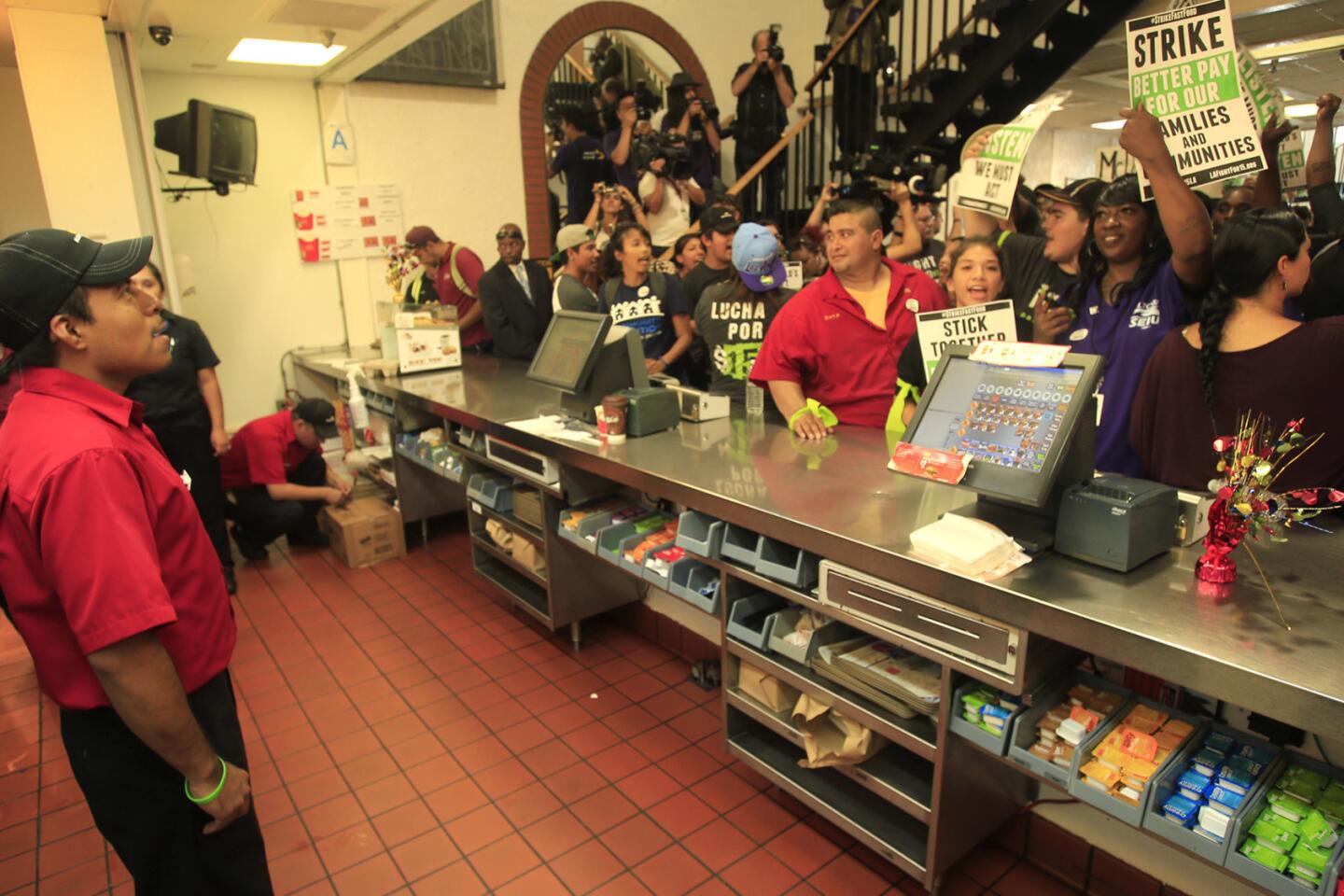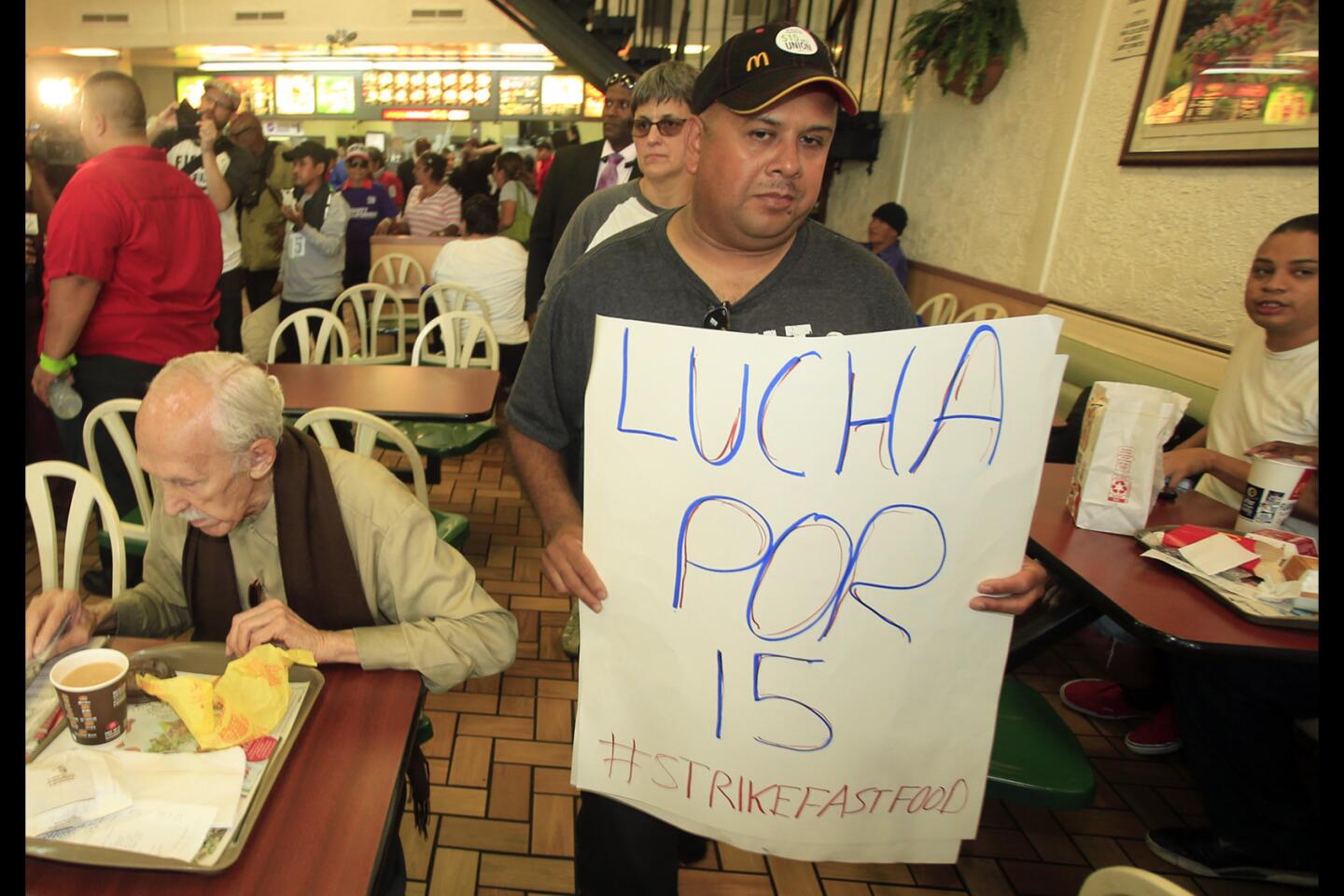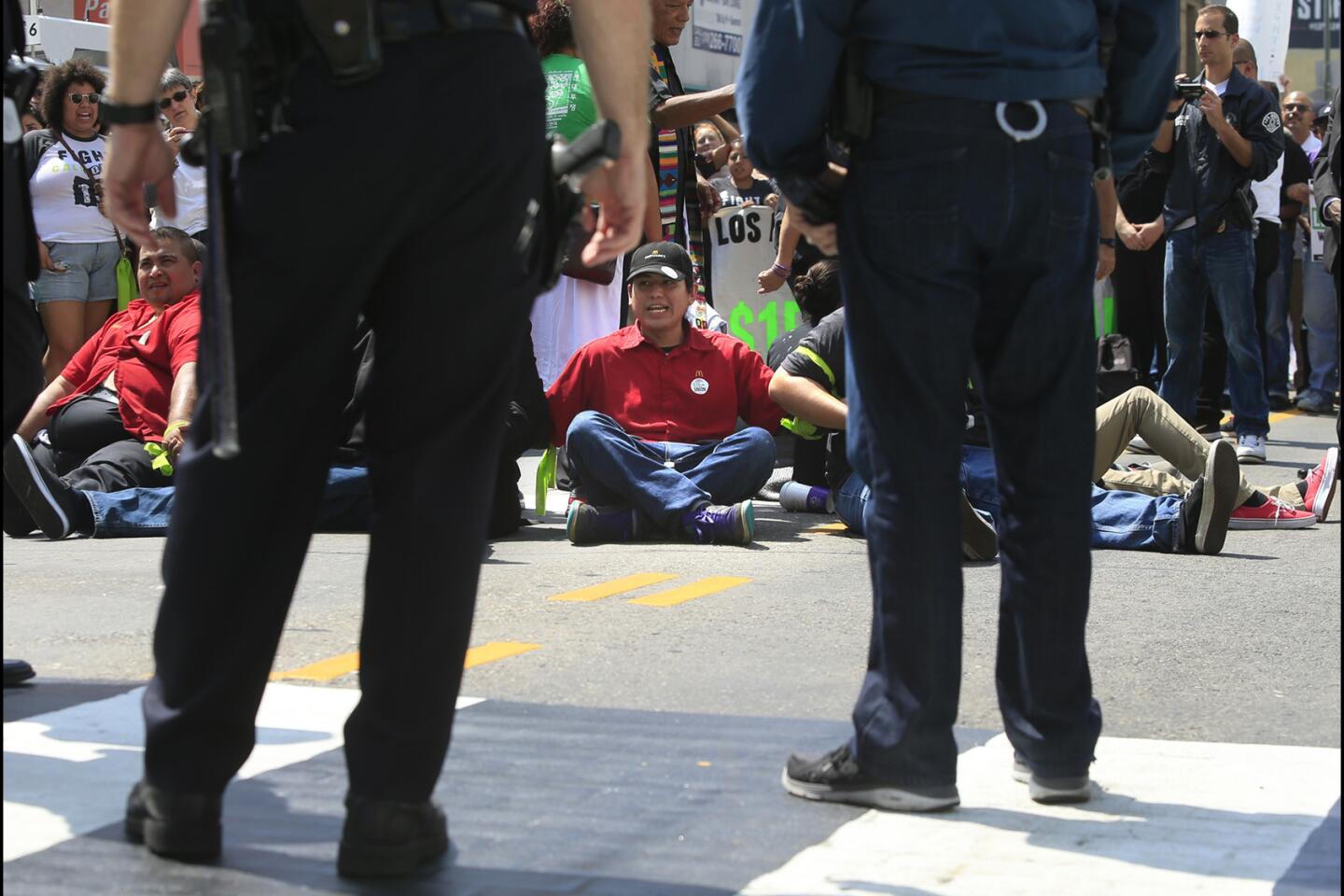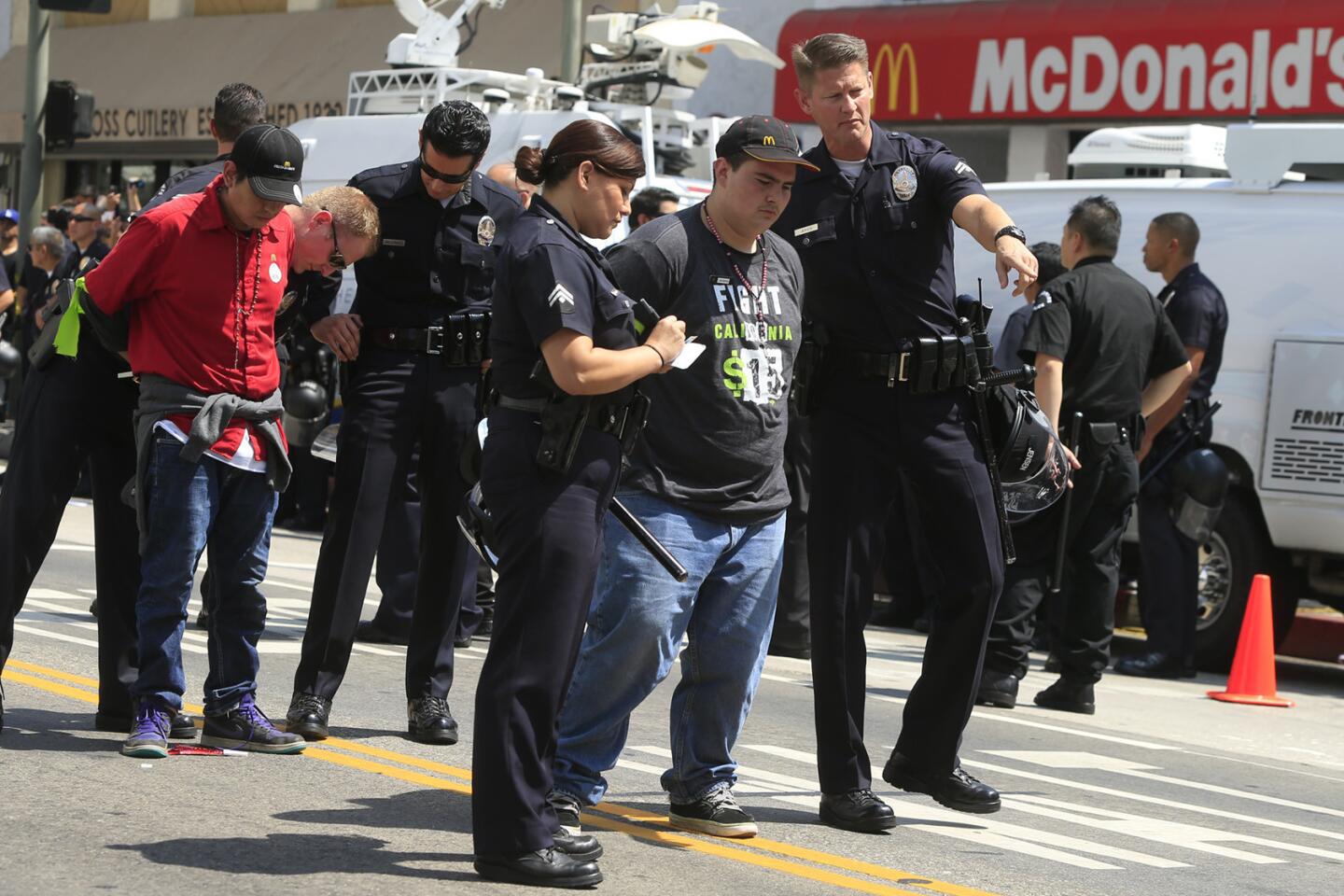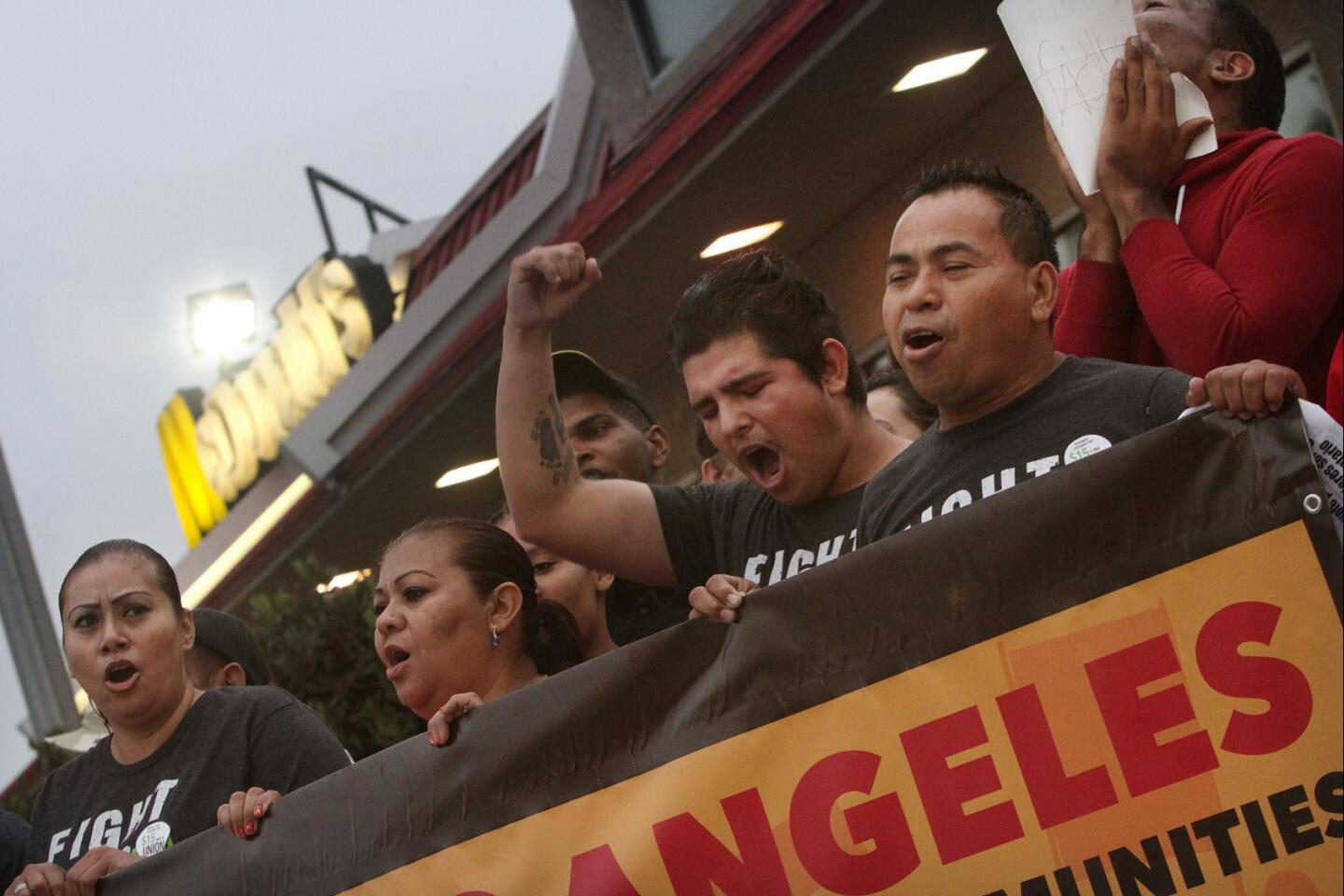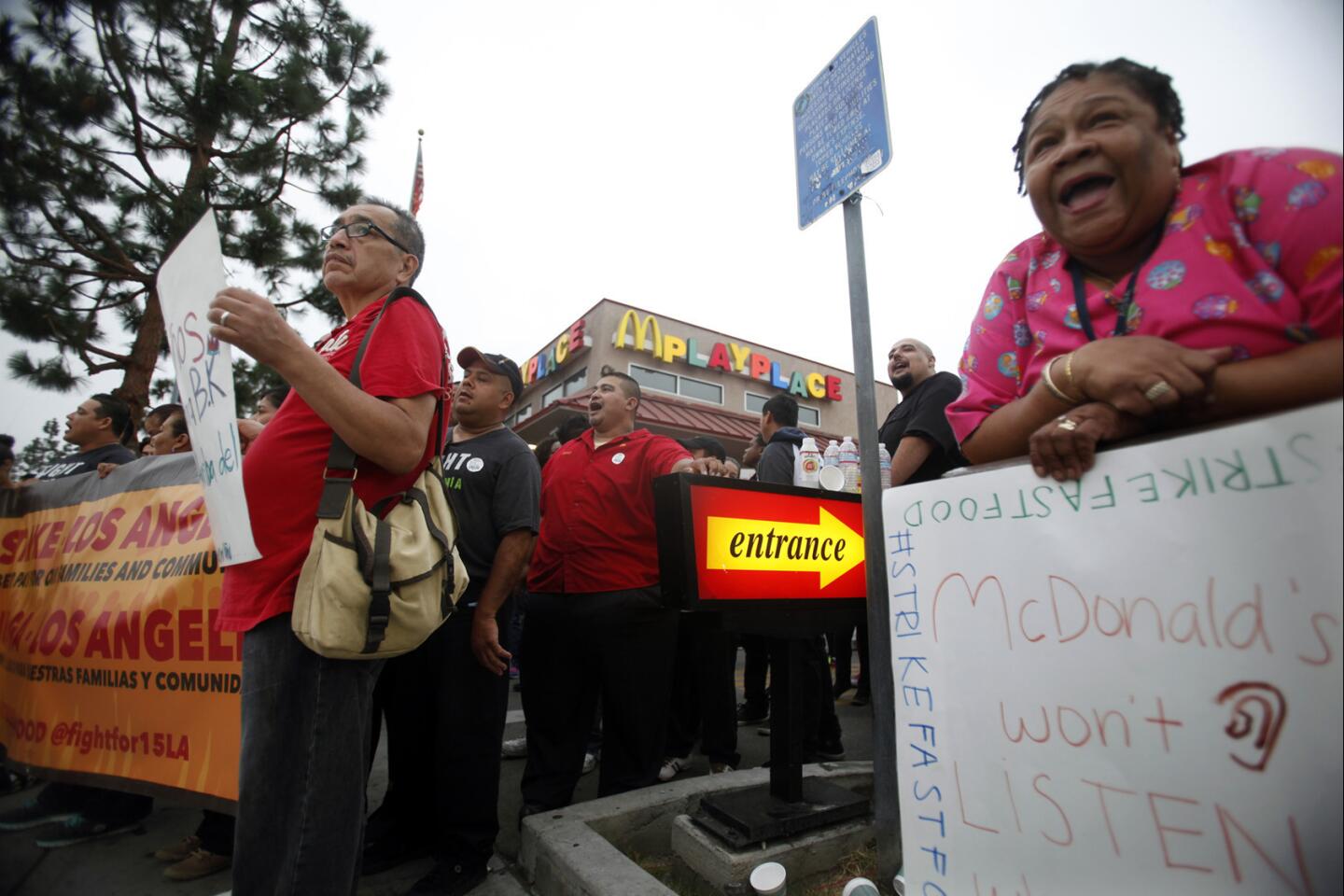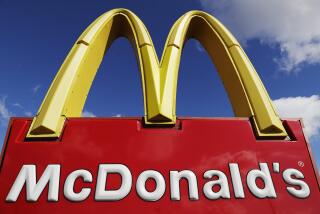Fast-food protests: Dozens of workers arrested in strike for higher pay
Dozens of fast-food workers from Los Angeles to Manhattan were arrested as they escalated a fight for better pay Thursday with strikes, rallies and acts of civil disobedience.
Police took 10 people into custody after the protesters linked arms and sat down in front of a McDonald’s in downtown Los Angeles. The sit-in capped a midday march through the urban core by hundreds of workers and their supporters.
In San Diego, 11 marchers were arrested for blocking an intersection in the blue-collar neighborhood of City Heights. They were cited for unlawful assembly and released.
Ralllies and sit-ins occurred outside McDonald’s restaurants across the country, including Rockford, Ill.; Hartford, Conn.; Boston; Philadelphia; Atlanta; and Miami. Elsewhere, 19 fast-food workers were arrested in New York; 42 in Detroit; 23 in Chicago; 11 in Little Rock, Ark.; and 10 in Las Vegas.
In downtown Los Angeles, protesters seeking wages of $15 an hour staged a lunchtime march before converging in front of a McDonald’s on Broadway. To the sounds of a beating drum, they cycled through chants such as “We want 15 and a union!” and “Si se puede!”
After police warned the crowd to stop blocking traffic lanes, nine fast food workers and a minister remained seated. They were arrested and led away, their hands bound with plastic zip-ties behind their backs.
It was just one of several demonstrations that were planned in the Southland.
Before dawn, more than 100 workers converged on a McDonald’s in L.A.’s Exposition Park to join the nationwide protests. They went inside the store for 10 minutes as workers stood stone-faced behind the cash registers.
The protesters held up signs and chanted slogans like “Get up! Get down! Fast-food workers run this town!” near a scrum of media trucks outside the McDonald’s.
Fanny Velazquez, 36, said she was participating in the protest to fight for better wages to support her family. A single mother with three children, ages 11, 14 and 16, she said she struggles to make her $9.34-an-hour pay cover all the bills.
The South Los Angeles resident has been working at McDonald’s for eight years doing a variety of jobs, usually working 20 hours a week, she said. But lately, Velazquez said, the company has often cut her hours to 15 a week. She also qualifies for welfare and food assistance.
“It’s difficult, it’s not enough to pay my bills,” she said.
A series of protests funded in part by the Service Employees International Union and local activist groups have sought to spotlight the plight of low-wage workers and push for higher pay by staging protests and walkouts in more than 100 cities in the one-day demonstration.
In San Diego, several hundred fast-food workers and their supporters marched past McDonald’s, Burger King and Jack in the Box restaurants. The protesters are “fighting for what we believe is right,” said the Rev. Lee Hill of the United Church of Christ.
The San Diego protest comes as business leaders there are attempting to qualify a measure for the ballot to overturn the City Council’s recent decision to raise the local minimum wage to $11.50 by 2017.
In New York, a crowd of about 300 converged outside a McDonald’s near Times Square at the height of morning rush hour, briefly blocking West 42nd Street. Police arrested about two dozen of the protesters.
And in Chicago, almost two dozen protesters were arrested near a McDonald’s where 150 gathered.
McDonald’s said in a statement that it respected “everyone’s rights to peacefully protest” and supported “paying our valued employees fair wages.”
The fast-food chain said the minimum wage discussion affects the entire country, not just one company, and should be considered within a broader context of issues, including the effects of the Affordable Care Act.
“We believe that any minimum wage increase should be implemented over time so that the impact on owners of small- and medium-sized businesses -- like the ones who own and operate the majority of our restaurants -- is manageable,” the company said.
McDonald’s pointed out that it does not set wages for its more than 3,000 franchisees in the U.S. Burger King also said it does not make wage or scheduling decisions for its franchisees, which operate nearly all of its restaurants.
Sue Hensley, spokeswoman for the National Restaurant Assn., said the Thursday job actions were part of a “multimillion-dollar campaign” orchestrated by labor groups that are trying to boost their “dwindling membership.”
“The activities have proven to be orchestrated union PR events where the vast majority of participants are activists and paid demonstrators,” she wrote in an email. “Restaurants continue to be a critical employer that trains America’s workforce and provides a pathway towards upward mobility and success.”
Many fast-food chains and independent restaurants have said that a $15 hourly wage would lead to big price increases on their menus or make it impossible to eke out a profit. Some industry watchers say that restaurants may try to cut costs by slashing hours for employees or reducing their workforces, ultimately hurting the same people who are fighting for better pay.
Edgar Gonzalez, 22, of Inglewood is hopeful that the protests will help ensure a better future for his family. He and his girlfriend both work at McDonald’s -- she is a manager, while he works in maintenance. Together, they can still barely afford to cover all their expenses, especially with a 4-month-old daughter, he said.
“Sometimes we find whatever change there is to buy formula, wipes, diapers,” Gonzalez said. He said they often make the choice between paying rent and buying healthy food to eat.
Workers at Burger King and other fast-food eateries in Los Angeles were also planning to walk out Thursday to demand the $15-an-hour wage, organizers said.
“Fast food is an industry that is doing exceedingly well, and workers feel they are in a good position to bargain for $15 an hour,” said Marqueece Harris-Dawson, president of Community Coalition, a local advocacy group in South L.A. that is participating in the local protests. “Workers of different stripes have been pressing to raise the conversation about the low end of the wage scale.”
Home-care workers are also joining in some Thursday protests in an effort to widen the movement, although none are participating in Los Angeles.
Hours after the morning protest in Manhattan, marchers gathered again on the busy corner of 8th Avenue and 56th Street, where several were swiftly arrested and taken away in a police van after they lay down on the pavement and blocked traffic.
Naquashia LeGrand, a KFC employee in Brooklyn, said she works 12 hours a week and earns $8 an hour. In three years on the job she has gotten one raise, she said, from $7.25 an hour, which was the previous state minimum wage, to the current $8.
“Full-time or part-time, we deserve a livable wage,” said LeGrand, who added that she would love to work more hours. “I’m here today, honestly, to better the future for the next generation,” she said, accusing big corporations of taking advantage of workers like herself.
Lunchtime diners at a nearby open-air bar watched the protest and arrests, which lasted no more than half an hour. “Good for them,” one man in a business suit said who was weaving his way through protesters as they chanted and disrupted traffic. “Everyone deserves to make a living. “
The fight for a living wage and higher minimum pay has gained steam this year as rallies, sit-ins and strikes have raised awareness of the issue.
In June, Seattle leaders voted to raise the city’s minimum wage to $15 an hour, the highest minimum of any metropolis in the country. The Los Angeles Unified School District signed a contract in July to raise its minimum wage to $15 an hour by 2016, which will boost the earnings of its lowest-paid employees, including custodians and cafeteria workers.
Los Angeles Mayor Eric Garcetti is pushing for a $13.25 minimum wage for all workers in L.A. by 2017. California’s current minimum wage is $9 an hour.
On Labor Day, President Obama touched on the fast-food movement during a speech in Milwaukee.
“All across the country right now there’s a national movement going on made up of fast-food workers organizing to lift wages so they can provide for their families with pride and dignity,” he said Monday. “There is no denying a simple truth. America deserves a raise.”
Follow Shan Li on Twitter @ShanLi
More to Read
Inside the business of entertainment
The Wide Shot brings you news, analysis and insights on everything from streaming wars to production — and what it all means for the future.
You may occasionally receive promotional content from the Los Angeles Times.
